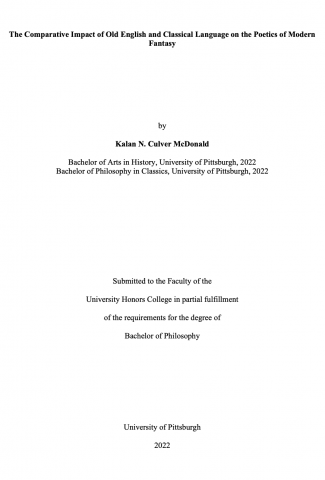
Emerging largely in the mid-twentieth century, the modern corpus of fantasy literature has risen to cultural prominence through works such as The Lord of the Rings, Harry Potter, A Game of Thrones, and their subsequent screen adaptations. Moreover, in each lie distinct instances of poetic interludes, a style unique to fantasy in its frequency. Yet, in order to understand the nuances of the genre, it is critical to thoroughly evaluate the landscape of linguistic traditions in which its language lies. In other words, one must consider how the style of modern fantasy exists in quasi-filial relation to past traditions. In so doing, it is possible to observe characteristics of both Classical and Old English form which have persisted into modernity. This research aims to evaluate the extent to which each tradition has impacted fantasy poetics by observing forms derived from oral-formulaic composition, figurative language, and the cultural values prioritized by alternative naming patterns. Furthermore, this work seeks to utilize J.R.R. Tolkien, due to his scholarly work in philology in conjunction with the widespread influence of his fantasy novels, as a lens through which to view the dissemination of the structures of Antiquity and to justify the practice thereof. Ultimately, this enables the reader and researcher to further discuss the subconscious values ingrained in fantasy literature through language and additionally reframes commonly accepted views as to the prominent linguistic influences behind Western literature and popular culture.
